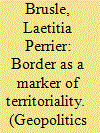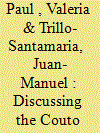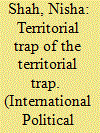| Srl | Item |
| 1 |
ID:
123711


|
|
|
|
|
| Publication |
2013.
|
| Summary/Abstract |
This paper considers the film Frozen River (2008) for the purpose of considering how the US-Canadian border is dramatised within the context of two women caught up in a illicit trading of migrants via a Native American Reservation. Re-calibrating more mainstream Hollywood's fascination with the United States' southern border, Frozen River usefully focuses attention on two areas that deserve further reflection namely the materiality of borders and border crossings and biopolitics. The paper concludes with some reflections on how borders, biopolitics, dispossession and sovereignty need further theorization by political geographers and other scholars.
|
|
|
|
|
|
|
|
|
|
|
|
|
|
|
|
| 2 |
ID:
138969


|
|
|
|
|
| Summary/Abstract |
The assumption that the border between Spain and Portugal is a stable one since medieval times is commonplace. Thus, the territorial trap conception, as defined by John Agnew, dominates understanding of this border. This paper will focus on a specific border area, the Couto Mixto, in an effort to contest this territorial trap. Furthermore, using some of the emerging border studies concepts, mainly borderscapes and border poetics, this research will discuss how this particular territory has been recently recovered and recreated. The theoretical underpinnings are followed by an analysis of what the Couto was and how it has been reappropriated in narrative terms in the last twenty years. The paper concludes by discussing the empirical findings on the Couto in light of the theoretical sections. It is eventually suggested that tourism based on specific immaterial border legacy could encourage Couto’s inhabitants and the precarious economy of the area.
|
|
|
|
|
|
|
|
|
|
|
|
|
|
|
|
| 3 |
ID:
111928


|
|
|
|
|
| Publication |
2012.
|
| Summary/Abstract |
This paper argues that attempts by theories of globalization to overcome the "territorial trap" have failed. Describing how the modern state emerged with two interrelated territories-a political concept about bounded jurisdiction and public good that over time is effaced but reinforced as territory is defined as brute, physical terrain-it shows that the assumption in globalization theories that territory is the state's physical area entrenches the normative defense of the territorial state as the framework of political order. The consequence is that overcoming the territorial trap not only requires uncovering how and why territory becomes an assumed political ideal, but also how and why this trap produces the subsequent trap of understanding territory primarily as the "physical substratum" of the sovereign state. Globalization theories' analysis of political transformation must therefore focus not only on the "permeability" of territorial borders, but whether and how evolving notions of global space might be providing a different political theory. A preliminary discussion of efforts to uncover how an alternative global spatial principle is reassembling political authority suggests a possible means of escape and way forward.
|
|
|
|
|
|
|
|
|
|
|
|
|
|
|
|